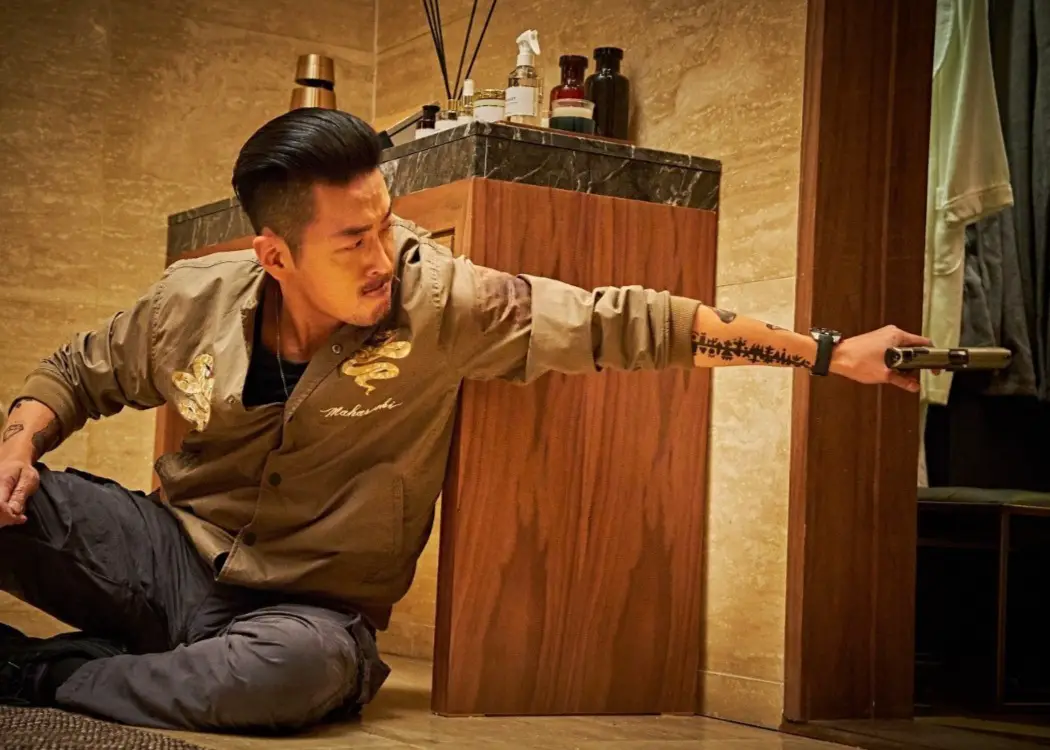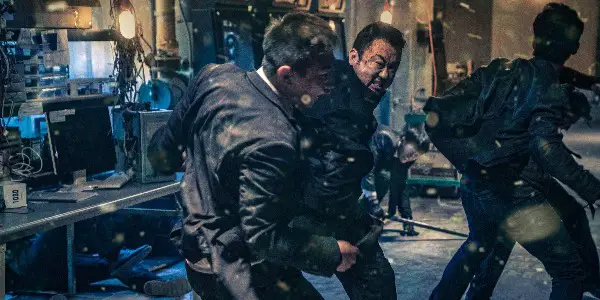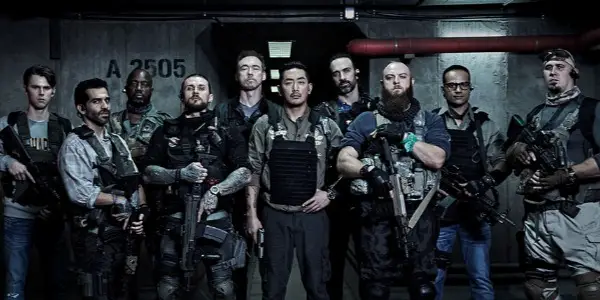Korean Film Festival 2019 Report: THE GANGSTER, THE COP, THE DEVIL & TAKE POINT

Alex is a 28 year-old West Australian who has a…
Now in its 10th year, the The Korean Film Festival in Australia (KOFFIA), has returned in 2019 with a line-up of the latest Korean films, that ranges from the Palme d’Or winning Parasite to the genre-bending musical Swing Kids. With 22 films within its program – 13 of which are Australian premieres – I’ve had the pleasure of previewing two of the festival’s best films, with each packing a serious punch in their own unique ways.
The Gangster, The Cop, The Devil (Lee Won-Tae)

Including “The Devil” in the title for your brand new South Korean revenge thriller is bound to evoke the horrifyingly violent but sublime pleasures of Kim-Jee Woon’s brutal I Saw The Devil, which pitted a pissed-off secret agent against a ghastly killer. In Lee Won-Tae’s sophomore feature The Gangster, The Cop, The Devil, a similar hypothesis is skilfully brought to vicious life on-screen; what if a gangster, scorned by an attack on his own life, decided to track down a prolific serial killer himself?
It’s a neat premise that allows for the elements of your standard ‘Se7en-derivative’ rogue cop vs murderer narrative to be cranked to the extreme, with a lone killer’s detached sensibilities colliding with a seemingly callous equal. A gangster may not kill randomly, but they aren’t afraid to wield a knife when headed for hard times – think The Good, The Bad and The Ugly, but remixed within South Korea’s trademark blood-soaked vengeance-seeking sensibilities.
It helps when that gangster is played by Don Lee, aka Ma Dong-Seok, the barrel-chested mountain of a man who gained worldwide prominence with Train to Busan, perfectly cast as the desperate father who must punch his way out of a zombie apocalypse. The Gangster, The Cop, The Devil also uses his physicality flawlessly, matching his brute force with a keen emotional intelligence that is rarely rewarded to characters such as his.
After a tense business meeting with a rival gangster, Jang Dong-Soo (Don Lee), who runs an illegal underground gambling machine empire, makes the mistake to drive home alone at night. While a foolish endeavour for anybody of such high prominence, Jang is targeted by a mysterious serial killer, who is only identified as K (the titular Devil, as it were). K’s murderous M.O. is simple: he rear-ends his victims and when they leave their car to inspect the damage, he viciously stabs them to death with a rusty kitchen knife.
Only this time, when his jagged blade is drawn, Jang fights back, with both barely surviving the encounter. As Jang’s re-cooperating, he’s approached by Jung Tae-seok (Kim Moo-yeol), a cavalier cop who plays by the edges of the book – he’ll enforce the law, but by any means necessary, much to the chagrin of his frustrated boss. Tae-seok is the only cop to latch onto the idea of these random road-side slayings being the work of a silent serial killer, thus a shaky alliance is formed between the two opposite sides of the law, as Jang has the manpower and Tae-seok has his police resources.
Besides the increasingly arbitrary deaths caused by K (who remains at a constant distance from the audience at all times, a shadowy presence that makes him more MacGuffin than man), this is a friendlier mainstream outing than say I Saw The Devil, lightened by regular intervals of fist fights, car chases and argument-ending slaps to keep attentive viewers entertained, all adeptly layered with Cho Young-Wuk’s rhythmic guitar score that keeps its ‘rebellious’ tone stabilised.
Park Se-Seung’s cinematography also delivers a helpful contribution towards this slick presentation, bathing South Korean night-life in a beautiful blend of neon lights and rain-soaked sidewalks that we’ve come to expect from the best of South Korean crime cinema. This is also an appropriate statement about its piquant plot, which plays like a compendium of the best of Park Chan-Wook, Kim-Jee Woon and their contemporaries that exploded in the early 2000’s in the wake of Oldboy’s well-deserved cult success.
Deaths are frequently delivered swiftly and without remorse, personal morality is merely a tool for manipulative rhetoric, the line between law-maker and law-breaker is blurred beyond repair, all culminating in a dingy warehouse where justice is to be served with the same tools we’d expect from the Saw franchise. It’s not totally derivative, although it lacks any real narrative invention or third-act surprise twists that’ll leave people talking – it’s a straightforward venture, but in a sea of similar imitations that have flooded the market in recent years, its technical ingenuity and crowd-pleasing confrontations guarantees that it stands above its peers.
Take Point (Kim Byung-woo)

South Korean director Kim Byung-woo’s rapid, action-packed fourth feature Take Point evolves the alarming atmosphere from his previous entry The Terror Live into another new agitating scenario, one that mutually expands upon the single location conceit and the stakes, when a simple mercenary mission threatens to kickstart another World War. As you can tell by its corny log-line, Take Point has absorbed the influences of contemporary American action cinema, so much so that when world crumbles around action star Ha Jung-woo, it’s hard not to picture a grizzled Gerard Butler taking over in the inevitable remake.
This is not a knock, as these Western influences make themselves apparent in its opening scene – not because of what we see, but rather what we hear – as the multicultural cast all speak English, with no subtitles required for those ignorantly avert to them. Mixing the claustrophobic intensity of The Raid with the overblown jingoistic theatrics of the Olympus Has Fallen franchise, Byung-woo has delivered a slick, entertaining package that manages to do something new with a lot of worn elements.
This might not seem like the case in its opening 20 minutes though, as Byung-woo’s screenplay really lays the complex exposition on thick; that despite being briskly delivered through a globe-trotting slideshow and an extended conversation between soldier for hire “Ahab” (Ha Jung-woo) and his American handler Mackenzie (Jennifer Ehle), the amount of double crosses, motivations and betrayals that are hammered out almost immediately will leave any regular viewer’s head’s reeling, and that’s before the actual bombs start dropping. Set in 2024, in order to save the abysmal approval ratings of the current US president (imagined as a real Clinton type), a rag-tag group of immigrants, headed by Ahab, have one night to kidnap a South Korean military official, with the purpose of quelling the tyrannical North Korean dictator, whose trade deals with China are tanking the US economy.
Objectives are shifted though when it’s revealed that the military official is the dictator, and the whole operation is a trap conceived by North Korea, who have put out a press release stating that the dictator has been killed by the mercenaries, which is grounds to begin war preparation. Thus, in order to clear his name and prevent a major war between the US, China and North Korea from erupting into assured nuclear destruction, Ahab must desperately keep the dictator – whose sleeping off a bullet wound – alive, a hard task exasperated by surrounding US drones, waves of armoured soldiers – and the loss of Ahab’s amputated leg.
Despite the amount of politics and politicians that are name-dropped to facilitate this plot, Take Point is focused on being a rollercoaster ride, not a diplomatic sermon on international relations, and it just works so damn well as an action film. It’s got a tight premise, plenty of well-executed set pieces, a dependable leading man and a ridiculous body count that’d make even Peckinpah blush – who could ask for anything else?
Do any of these titles interest you? Let us know in the comments!
The 10th Korean Film Festival in Australia is taking place in Sydney (22-31 Aug), Canberra (22-25 Aug), Brisbane (5-8 Sept) and Melbourne (5-12 Sept). Further details of the program and session times, can be found at http://www.koreanculture.org.au/korean-film-festival-in-australia/
Does content like this matter to you?
Become a Member and support film journalism. Unlock access to all of Film Inquiry`s great articles. Join a community of like-minded readers who are passionate about cinema - get access to our private members Network, give back to independent filmmakers, and more.













